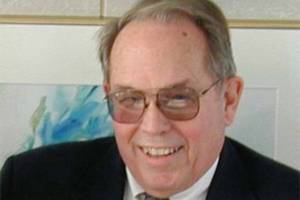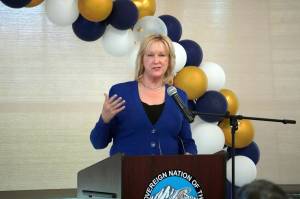Q&A: Kenai mayoral candidates share views
Published 12:07 am Friday, September 30, 2016
1. Does the new comprehensive plan reflect your vision for Kenai’s future development?
Brian Gabriel: Yes.
Captured in chapter 6 of the Imagine Kenai 2030 Comprehensive Plan are eight goals of the plan: Quality Of Life, Economic Development, Land Use, Public Improvements and Services, Transportation, Parks and Recreation, Natural Hazards and Disasters, and Environmental Resources.
For each goal, a vision is stated, objectives are identified, and action items are listed. In addition, implementation of the goals are outlined. These goals and objectives, along with the Land Use Plan and Land Use Map, are the basis that should guide the future development of the City.
The Imagine Kenai 2030 Comprehensive Plan was recently approved by the Kenai City Council and reflects my vision of Kenai’s future development because the plan provides for economic development, maintaining a healthy community with a high quality of life for its residents, and mitigating the impacts of commercial development to adjacent residential areas.
Hal Smalley: No! The 2016 Comprehensive Plan is a look alike of the 2013 Plan which was overwhelmingly defeated by voters. Council reintroduced a nearly identical plan for 2016 and held hearings.
Again citizen testimony from several areas expressed strong concerns about the same issues which had caused failure of the 2013 Plan: 1) lack of clear language regarding Buffers and Buffer Zones 2) the appearance of Spot Zoning in areas used to force the Comprehensive Plan and Land Use Plan to be in harmony 3) the use of Mixed Use Zones throughout the city may allow commercial development within some residential areas.
This Plan is a critical document which needs to clearly reflect a holistic look at the entire city. Input from elected leadership, those hired and most especially the broader perspective of its residents is what will make it effective and helpful to current and future city development.
2. What, if anything, would you change in the city’s budget?
Gabriel: I believe that the current budget adequately supports the services provided by the City.
The City’s budget is not that much different than your average household budget in that it is always a good idea to “live within your means”. As with your household budget, there will be unforeseen increases to existing expenses that are hard to account for. One area where this plays out in the City’s budget is in employee health care costs. These costs are usually not known until Administration is preparing the budget and can vary substantially. At the June 2016 Kenai City Council meeting to approve this year’s budget, I proposed to restrict a portion of the funds available over fund balance to help account for future increases in employee health care costs.
This proposal was adopted by Council. The result of this change will ultimately provide a level of certainty to balance future budgets.
Smalley: Based on declining revenues, a careful analysis of services and costs will need to be done. Income from State Revenue Sharing is unlikely. Tough decisions are in our future. Decreased services? Increased mill rate or taxes? I don’t know what changes will be necessary. During the budget cycle it will require both examining the big picture, as well as a department-by-department review. I don’t know all of the questions, but I am committed to being part of a vigorous and thorough review process to find the best solutions for Kenai
On a citizen’s personal budget level is a question I’ve heard related to water and sewer rates. Is it fair for all residents to pay the same rate? Is there a way to make it more equitable? That also needs to be explored.
3. How would you improve community engagement with the city council?
Gabriel: As elected officials, it is important that the Kenai City Council involve the citizens of the community in the decision making process.
One area to improve engagement with the City Council is through the use of technology.
For example, public speaking can be an obstacle for many residents that would like to testify to an item on our agenda. At present, written testimony can be submitted to the City Clerk with a request to include as a laydown for the meeting or correspondence to the individual Councilmembers through e-mail, phone, etc.
Making written testimony available to the Council for people that are unable to attend the meeting or feel uncomfortable testifying in public should be more convenient. This can be done through a form on the City’s website that could simply be filled out and submitted. The submitted comments then would be automatically delivered to Council and be included as part of the record.
Smalley: What has been reaffirmed in my visiting with 100’s of residents as I go door-to-door is that everyone has opinions and concerns to share.
The Saturday mornings with the Mayor have proven to be one good way to engage people – an informal setting with information and ideas shared. I would be open to creative ways to provide other venues for voices to be heard..
As basic as it may sound, how public testimony is received at Commission and Council Meetings can go a long way to encourage (or discourage) participation. Yes, there may be redundancy and yes, we may hear things with which we don’t agree. But I’m committed to listening and being respectful. While our chairs sit a few inches higher off the floor than those testifying, and we are “the” representatives, we work for the residents. On a personal level, as Mayor, I will also be available.
4. What do you see as the biggest challenges facing Kenai in the next three years?
Gabriel: 1) Hiring of the new City Manager.
Since the City of Kenai operates under a Council-Manager form of government, the City Manager acts as the Chief Administrative Officer and head of the Administrative branch of the City Government. These duties include the day-to-day operations of the City. It will be important to hire a person that has the qualifications, demeanor, and positive attitude required to engage with the citizens and businesses of the community.
2) Budget.
Given the fiscal uncertainty of the State, it will be important to keep a close eye on the budget and “live within our means”.
3) Small business environment.
Reach out to existing small businesses to determine what the City can do to help them be successful and work to encourage new businesses in the City.
4) Bluff erosion.
Continue work to move this project forward.
Smalley: Without a doubt, economic development is the biggest challenge facing all Alaskan cities as we cope with the effects of low oil prices.
One of Kenai’s considerable assets is our airport land – a bit like our own Permanent Fund. Kenai is charged with managing this valuable land and it needs to be done in a systematic, equitable manner as a critical responsibility of the council. Its management should provide both essential funds for our airport, as well as stability for businesses that lease or purchase the land. All city land should be managed for the best possible return.
The City needs to refocus its attention on the Bluff Erosion Project. It is imperative that our attention not waiver and that we do whatever is necessary to get the project built. It has been a priority for two decades. That’s too long without results.
A clear vision for the future is the bottom line.
5. How can voters contact you?
Gabriel: Phone: 690-2089; Email: gabriel1@alaska.net; Brian Gabriel for Kenai Mayor Facebook Page.
Smalley: Home phone 283-7469. Campaign email: halsmalley4mayor@yahoo.com Facebook address: HalSmalley Mayor




